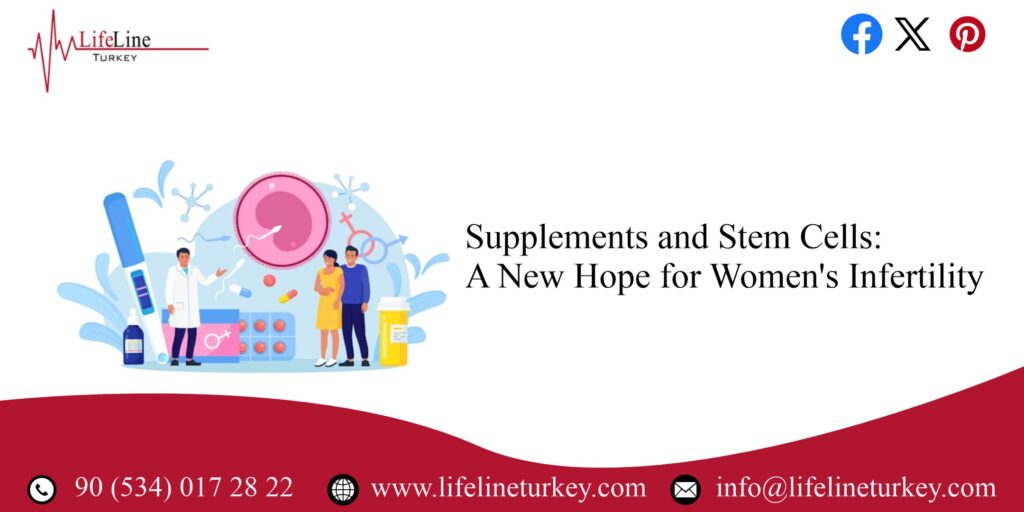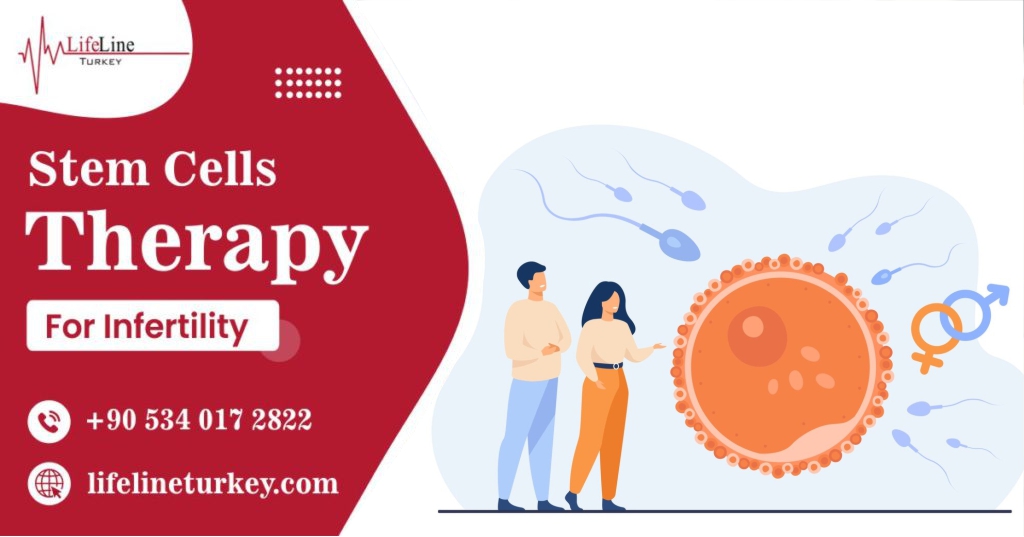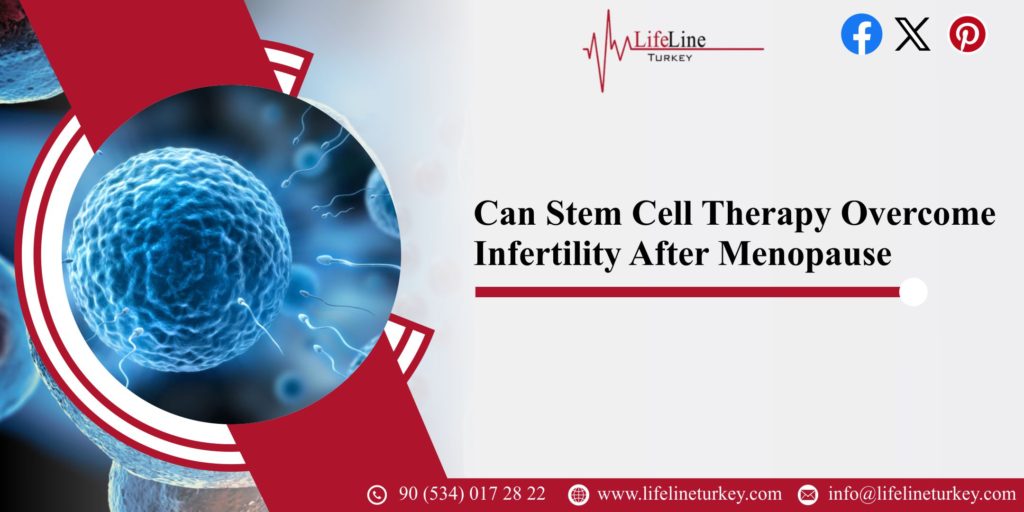Infertility is a significant concern affecting many women worldwide, often causing emotional and physical distress. While many have found hope in traditional treatments like hormone therapy, surgery, and assisted reproductive technologies (ART), researchers are now exploring emerging approaches like supplements and stem cell therapy as promising alternatives or complementary treatments. This blog post explores two emerging areas of research offering new hope for infertile women: supplements and stem cells.
Understanding Infertility in Women
Infertility occurs after one year of regular, unprotected sexual activity. Several factors can contribute to infertility in women, including:
- Ovulatory Disorders: Problems with ovulation account for a significant percentage of infertility cases.
- Tubal Infertility: Damage to the fallopian tubes can prevent the sperm from reaching the egg.
- Endometriosis: This condition involves the growth of uterine tissue outside the uterus, causing pain and potentially leading to infertility.
- Uterine or Cervical Abnormalities: Structural issues or abnormalities in the uterus or cervix can hinder conception or implantation.
- Age: As women age, the quantity and quality of their eggs decline, making conception more challenging.
The Role of Supplements in Infertility Treatment
Nutritional supplements have garnered attention for their potential role in improving fertility. An important factor in female fertility is egg quality, which influences conception and pregnancy outcomes. Several nutritional supplements have shown the potential to enhance egg quality through various mechanisms. Here’s a closer look at how specific supplements contribute to this improvement:
- Coenzyme Q10 (CoQ10)
Mechanism:
- Energy Production: CoQ10 plays a crucial role in producing adenosine triphosphate (ATP), the primary energy currency of cells. High levels of ATP are required for eggs to function and mature properly.
- Antioxidant Properties: CoQ10 is a powerful antioxidant, protecting eggs from oxidative stress and damage caused by free radicals. Oxidative stress can impair egg quality and lead to DNA damage.
Evidence:
- Studies have shown that CoQ10 supplementation can improve ovarian response and increase the number of high-quality eggs retrieved during in vitro fertilization (IVF) cycles, especially in older women.
- DHEA (Dehydroepiandrosterone)
Mechanism:
- Hormonal Balance: DHEA is a precursor to sex hormones, including estrogen and testosterone. Supplementation can help restore hormonal balance, which is crucial for ovarian function.
- Follicular Development: DHEA can stimulate ovarian follicle development, potentially leading to an increase in mature eggs.
Evidence:
- Research indicates that DHEA supplementation can improve ovarian reserve, enhance egg quality, and increase pregnancy rates in women with diminished ovarian reserve (DOR).
- Myo-Inositol
Mechanism:
- Insulin Sensitivity: Myo-inositol improves insulin sensitivity and helps regulate blood sugar levels. It is particularly beneficial for women with polycystic ovary syndrome (PCOS), a condition often associated with insulin resistance.
- Oocyte Maturation: Myo-inositol plays a role in the maturation of oocytes (egg cells), promoting the development of high-quality eggs.
Evidence:
- Clinical studies have shown that myo-inositol supplementation can improve ovulatory function, egg quality, and clinical pregnancy rates in women with PCOS.
- Omega-3 Fatty Acids
Mechanism:
- Anti-Inflammatory Effects: Omega-3 fatty acids have strong anti-inflammatory properties, particularly eicosatetraenoic acid (EPA) and docosahexaenoic acid (DHA). Chronic inflammation can negatively impact ovarian function and egg quality.
- Cell Membrane Integrity: Omega-3s, including oocytes, are essential components of cell membranes. They help maintain cell membrane fluidity and integrity, which is necessary for egg quality and fertilization.
Evidence:
- Research suggests that omega-3 supplementation can improve reproductive outcomes, including egg quality, in women undergoing fertility treatments.
- Antioxidants (Vitamin C, Vitamin E, and Selenium)
Mechanism:
- Reduction of Oxidative Stress: Antioxidants neutralize free radicals, reducing oxidative stress that can damage eggs and impair their quality.
- DNA Protection: By protecting the DNA within oocytes from oxidative damage, antioxidants help maintain the genetic integrity of eggs.
Evidence:
- Studies have demonstrated that antioxidant supplementation can improve ovarian function and enhance the quality of eggs, potentially leading to better fertility outcomes.
- Folate (Vitamin B9)
Mechanism:
- DNA Synthesis and Repair: Folate is essential for DNA synthesis and repair and is critical during egg development and maturation.
- Methylation: Folate is vital for normal egg development because it plays a role in methylation, a biochemical process that regulates gene expression.
Evidence:
- Adequate folate levels have been associated with improved egg quality and higher rates of successful conception.
Stem Cells: A Cutting-Edge Approach
Stem cell therapy in Turkey is at the forefront of regenerative medicine and offers exciting possibilities for treating infertility. They can uniquely differentiate into the various cell types necessary for reproduction. Researchers are exploring stem cell therapy as a treatment for infertility:
- Ovarian Rejuvenation: Stem cells can potentially restore ovarian function in women with diminished ovarian reserve or premature ovarian failure. Researchers hope to stimulate the growth of new, healthy eggs by injecting stem cells into the ovaries.
- Endometrial Regeneration: In cases of severe endometrial damage or Asherman’s syndrome, stem cells may help regenerate the endometrial lining, making it more conducive to embryo implantation.
- Tubal Repair: Stem cell therapy may offer a solution for repairing damaged fallopian tubes, potentially restoring their functionality.
The Future of Infertility Treatment
The integration of supplements and stem cell therapy into infertility treatment protocols represents a new frontier in reproductive medicine. However, while promising, these approaches are still in the early stages of research and development. Clinical trials are ongoing to determine their safety, efficacy, and long-term outcomes.
Here are some key points to remember:
- Consult your doctor before taking any supplements. They can interact with your medications, so they may not be suitable for everyone.
- Focus on a healthy lifestyle. Eating a balanced diet, exercising regularly, and maintaining a healthy weight are all critical fertility factors.
- Don’t expect miracles. While supplements may help, they are unlikely to cure infertility.
Next-Gen IVF: The Power of Stem Cells!
While there are no magic bullets for infertility, both supplements and stem cell therapy for infertility in Turkey offer a glimmer of hope. Supplements may support overall fertility health, while stem cells hold promise for the future of fertility treatments. As research progresses, these approaches are more widely available and offer new options for women struggling to conceive.
Consult a doctor at Lifeline Turkey to discuss your situation and determine the best course of action.



